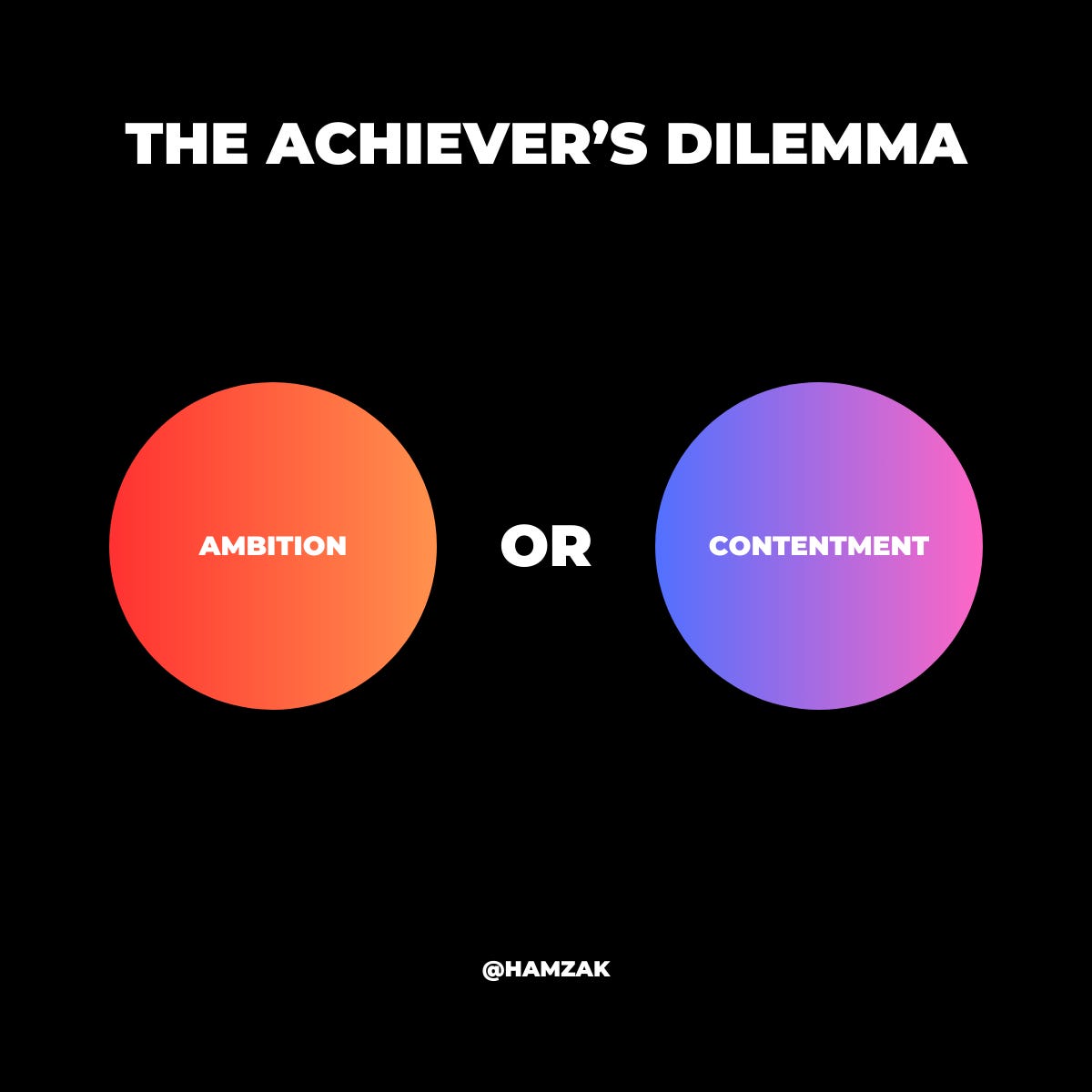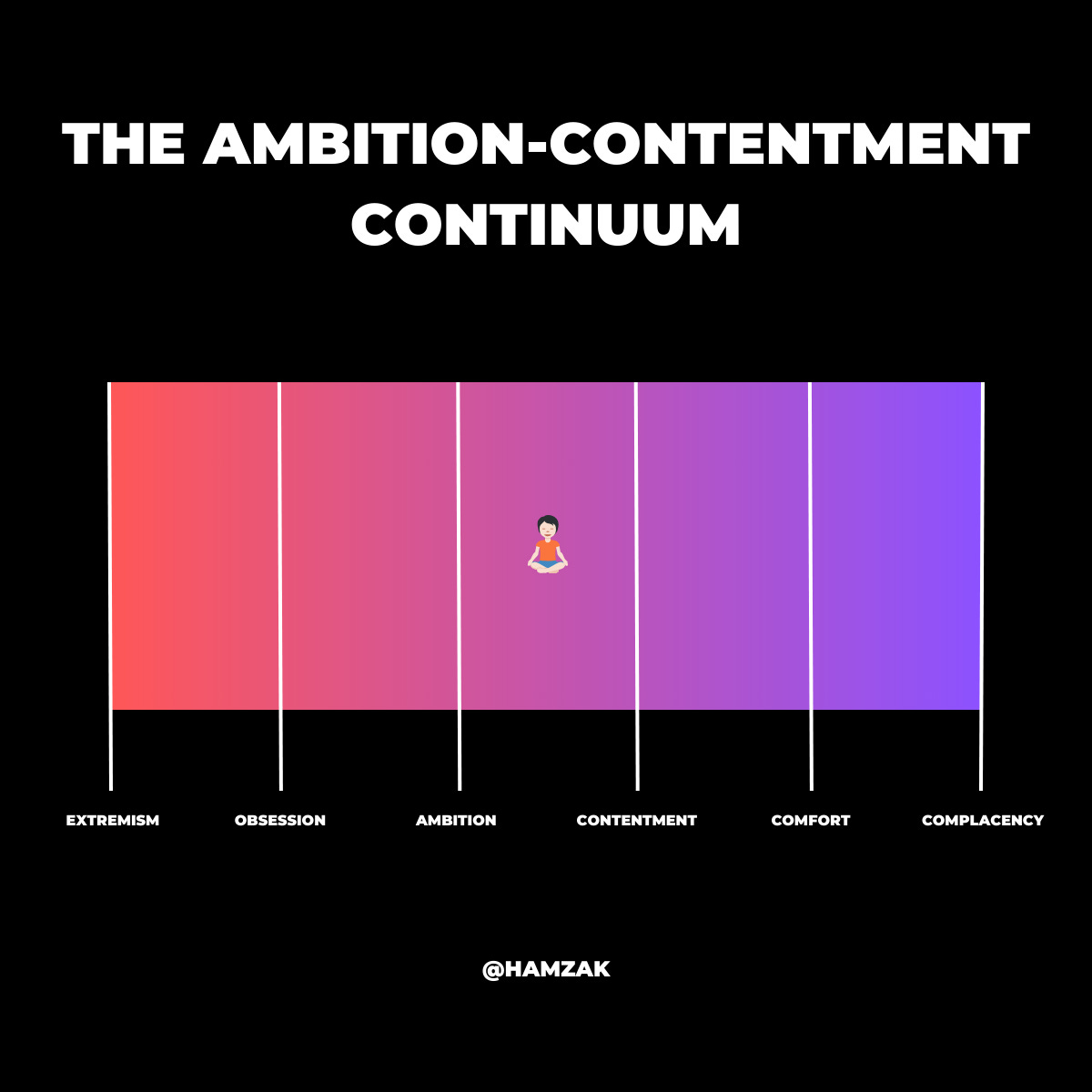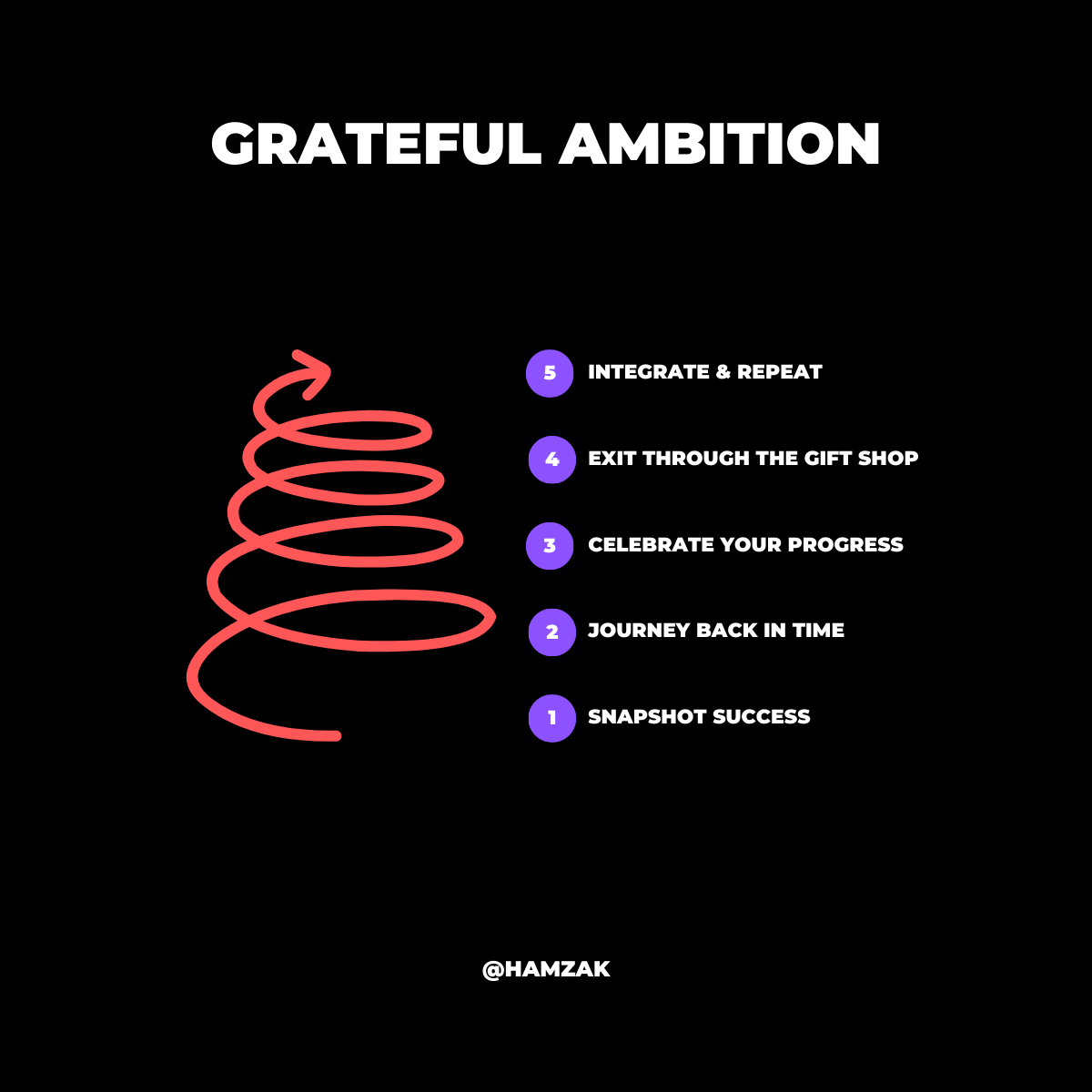“How could I forget? I was on a Greyhound way before the jet.” - Drake
SUMMARY: Overachievers rejoice—you can smell the roses without stopping. According to research, high ambition and contentment aren’t mutually exclusive—by actively reflecting on how you’ve overcome past personal challenges, you can perpetually raise your upper limit without sacrificing progress or happiness.
Don’t Stop Me Now
During the dog days of writing “The Burnout Gamble,” my mom gifted me an ornament with an engraved message:
“Success is getting what you want and finding the time to enjoy it.”
Low-key, I loathed the sentiment. I was restless, wrestling with writer’s block while dreading publisher deadlines; the last thing I wanted to do was stop and smell the roses. So I stashed the trinket on the bottom shelf of my bookcase, its message out of sight and out of mind. Then I got back to the grind.
The Achiever’s Dilemma
Ambition is inherently temporal. Achieving anything in the future—a job, a raise, a book, etc.—implies its absence in the present (i.e., unemployment, insufficient pay, an unfinished book)
Overcoming the absence requires a bargain with time itself: expenditure (of time, energy, attention) in the present for a result in the future. Ambition demands sacrifice, and usually, the bigger the ambition, the bigger the sacrifice.

Contentment, on the other hand, is timeless. You can choose to be content at any point in time, irrespective of achievement. But the idea of stopping or slowing down seems counterproductive for overachievers doggedly pursuing their ambitions. As I did in the final stretch of writing “The Burnout Gamble,” we “burners” tend to go all-in with our ambition, completely forfeiting contentment until we arrive at our destination.
This is where it gets tricky.
The Ambition-Contentment Continuum
According to research published in Motivation and Emotion, unregulated ambition—overachievement—is associated with obsessive passion. And obsessive passion reliably predicts extremism, which precedes burnout. In other words, ambition without contentment can sabotage success.
The irony of nearly burning out while writing “The Burnout Gamble” isn’t lost on me—in fact, it inspired the “Overcome Overachievement” section of the book.
Breaking from the achiever’s dilemma requires a break with conventional thinking: the opposite of maximum ambition isn’t contentment—it’s complacency.

Not only is there no conflict between extreme ambition and contentment, but research says that they’re perfectly compatible.
A False Dichotomy
Several studies have found that people with high levels of ambition who are also content with their current situation are likelier to feel content than those who are only ambitious or content. In other words, people who balance ambition and contentment are better suited to achieve more than those concerned with one or the other.
We know that unregulated ambition yields to obsession, which leads to diminished performance. But on the other end of the spectrum, unregulated contentment yields to complacency, which also leads to diminished performance. But when ambition is mixed with contentment—when we’re meaningfully engaged with our ambitions—that’s when we’re truly dialed in.
We can visualize these findings by mapping them onto The Yerkes-Dodson Law:

It turns out I was wrong to doubt my mom’s ornament: optimal performance is achieved by mixing ambition and contentment.
Gratefully Ambitious
How can you mix high ambition and contentment without stopping or slowing down? A study from The University of Zurich found that actively reflecting on how you’ve overcome past personal challenges can help you process negative experiences and solidify the resilience necessary to outlast similar challenges in the future. Put another way, you can continually raise your upper limit by actively reminding yourself of your self-efficacy.
Rather than stopping to smell the roses, overachievers can smell the roses on the go. Here’s how:
Step 1: Snapshot Your Success
Enhance your existing journaling routine with a simple time-bound gratitude prompt, such as “What is an accomplishment you’re proud of this week?” or “What are you grateful for today?” Take a snapshot of success, and then activate your time machine.
Step 2: Journey Back In Time
Next, journey back in time to a distant point from your recent success snapshot (the further, the better). Briefly return to when your life didn’t have the contented circumstances you acknowledged in the previous step. Gently re-engage with the old pain or frustration of not having what you wanted. Then, re-activate your time machine.
Step 3: Celebrate Your Progress
Return to the present moment and recognize the contrast between your circumstances then and now. Meditate on the contrast. Celebrate just how far you’ve come, and bask in the feelings of accomplishment. You’ve earned it.
Step 4: Exit Through The Gift Shop
Nearing the end of this temporal adventure, identify the specific habit, lesson, practice, etc., that contributed to your triumph (and don’t be coy). There’s a good chance you’ll need it again as you repeat this virtuous spiral.
Step 5: Integrate & Repeat
Stay with the feeling of success for as long as you can, integrating it into your concept of “normal.” Accept that your success isn’t accidental but rather the inevitability of your journey. And then repeat steps 1-5 when you’re ready.

Now We’re Here
Over a birthday dinner at Dai Lo, a top-rated Toronto establishment, with three of my most accomplished friends, I was intrigued to learn that they, too, were trying to find the sweet spot between ambition and contentment. “Is it a binary choice?” we wondered. “Do we just toggle between both states?”
Our hostess pleasantly interrupted our ponderance with a surprise course in our premium tasting experience: Big Mac Baos—an inspired artisanal variation of the fast food classic. The hit of juicy nostalgia sandwiched between feelings of triumph had me astral travel to a time when my debit card would get declined trying to buy anything from McDonald’s.
Returning from memories of insufficient funds to my friends, I took stock of the fact that we were living out our ancestors’ wildest dreams. That evening, none of us reviewed our menu cards. None of us knew what our bill would be. And none of us were concerned about any “damage” at the end of the night. There was an unspoken understanding that we deserved to celebrate more life and more success, given our respective sacrifices. And that our rising upper limits would nullify any possibility of discomfort.
A humbling far cry from the poverty, ignorance, and vulnerability endured by our parents, and their parents before them.
Roses To Go
Some people want to achieve their dreams as much as they want to breathe. The human body will do almost anything to breathe without oxygen. We’ll find some spare energy that suddenly motivates us to take action.
For all you fellow “burners”—overachievers—reading this: stopping to smell the roses might feel counterproductive, but you can rejoice knowing that you don’t have to stop or even slow down. While on the ascent, simply acknowledge how high you’ve climbed.
Go ahead and take your roses while you can still smell them; take your roses to go.
What my mom tried to suggest with her gift was that you can savor contentment without sacrificing ambition. Both things are possible. And integrated as “grateful ambition,” they form the sturdy scaffolding of sustainable success.




